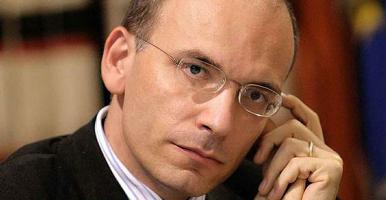President of Italy Nominates Center-Left Official as Premier

And former Prime Minister Silvio Berlusconi, the great survivor of Italian politics, emerged as a kingmaker by default, having outlasted most of his adversaries.
“It`s undeniable that this is a victory for Berlusconi,” said Giovanni Orsina, the deputy director of the School of Government at Luiss Guido Carli University in Rome. “He got what he asked for, from Napolitano`s re-election to a political government with broad, bipartisan support.”
In accepting his mandate Wednesday, Mr. Letta said that he would focus on employment and growth — unemployment is over 11 percent in Italy, rising to 38 percent for young people — but also that he hoped the tide in Europe was shifting against austerity policies that have deepened an economic slowdown in Southern Europe.
He cited the president of the European Commission, José Manuel Barroso, who in a speech this week had said that while reining in budget deficits through austerity was “fundamentally right,” it had “reached its limits” and needed “the minimum of political and social support.”
Mr. Letta is a Democratic Party moderate, former government minister and former member of the European Parliament. At 46, he is poised to become one of Europe`s youngest prime ministers, but he is less a new-guard politician than a compromise candidate palatable to his own imploding center-left party and to the center right — a young facade on a political edifice in the throes of collapse.
“On paper, Letta is a good candidate,” Mr. Orsina said. “It`s a new generation taking power. But they certainly chose the most moderate young man, somebody who comes from the establishment.”
“It`s going to be hard for him to change the bureaucratic structure, the state machine, because that is the main issue,” Mr. Orsina added, referring to a system whose members have traditionally been appointed through patronage. “If your pan has a hole, changing the handle will do little good.”
Mr. Letta must propose a cabinet and present it to Mr. Napolitano and then Parliament for a confidence vote in the coming days. The strength and duration of his government will depend on how broad a coalition he is able to forge.
Mr. Letta would replace the caretaker prime minister, Mario Monti, who came into office during intense market turmoil in November 2011. Mr. Monti`s yearlong technocratic government improved Italy`s credibility in Europe, but he failed to muster the political support to push through changes to help invigorate Italy`s economy. He fell when Mr. Berlusconi withdrew his support in December.
Mr. Letta is seen as being capable of reuniting the beleaguered Democratic Party with Mr. Monti`s Civic Choice group, which took less than 10 percent of the vote in the national election in February, and the center right. Mr. Letta is the nephew of Mr. Berlusconi`s close aide, Gianni Letta.
In an acknowledgment of growing popular anger at politicians, Mr. Letta said Wednesday that he wanted to reduce the number of lawmakers and restore confidence in Italy`s political class, which is running at an all-time low. The Five Star Movement of Beppe Grillo, a former comedian, won a quarter of the vote in February on a populist platform of disgust with the status quo.
Like the current Greek government, a three-party coalition in which historical enemies on the left and right have joined together out of fear of extinction and a lack of viable alternatives, Mr. Letta is potentially the last gasp of a political cycle that in Italy began in the early 1990s with the collapse of the postwar political order and the rise of Mr. Berlusconi.
That much was clear last weekend when, in a sign of a profound lack of consensus or imagination, a deeply divided Parliament elected Mr. Napolitano, 87, to a second term as president — after failing to settle on a new face for the first time in Italy`s postwar republic.















































